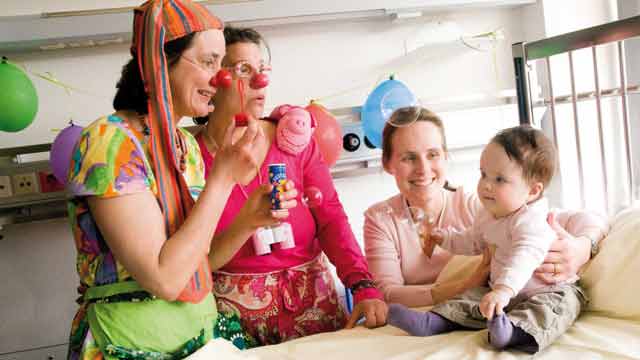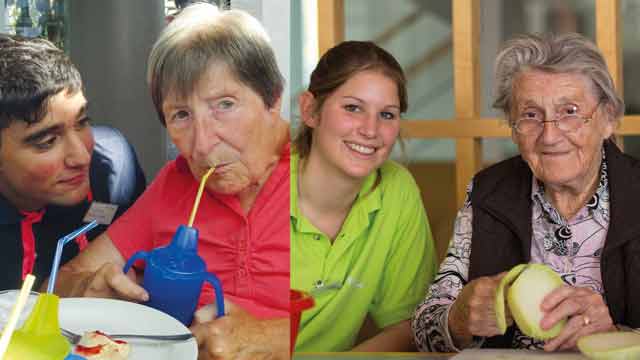
With the forum ‚Bildung Digitaliserung‘ (Education and Digitisation), five foundations have created a platform for learning in a digitised world.
From left: Prof. Dr. Wolfgang Schuster, Chairman of the Deutsche Telekom Stiftung, Dr. Jörg Dräger, Management board member of the Bertelsmann Stiftung, Uta-Michaela Dürig, Director of the Robert Bosch Stiftung, Winfried Kneip, Director of the Stiftung Mercator and Dr. Nathalie von Siemens, Managing Director and board spokesperson of the Siemens Stiftung.
Foundations move people
The mission of non-profit foundation can be
drivers of digital change
The complex challenges entailed by changes caused by digitisation, cultural diversity and demographic development need to be addressed as a team and not as bystanders. Social stakeholders are called upon. Digitisation and networking pose the whole of society with extraordinary challenges in the fields of education, basic and continued training and research. As essentially foundations regard their role to be that of providing impetus to people and things, and being constructive architects of the future of the community, our foundations can become a driver of digital change. In line with their social, often non-profit-making foundation mission, they pursue goals that are congruent with the challenges posed by the consequences of digitisation. If links are to be forged between past and future, opportunities for discussion must be wrought, bridges built, educational work and investment instigated. This is work that has always been performed by many foundations. In the future, foundations can foster research projects, initiate or support discourse, promote people and ideas, fund university chairs, organise continued education or offer scholarships.These dedicated efforts by foundations in Germany look back on almost a thousand-year old tradition. They are thus among the oldest forms of commitment to the community.
“Digital education concerns society as a whole. It can help to improve our education system and promote more involvement and equal opportunities.”
 Prof. Dr. Wolfgang Schuster
Prof. Dr. Wolfgang Schuster
Chairman of the Board, Deutsche Telekom Stiftung
Against the background of this tradition and commitment Prof. Schuster has founded the Forum Education and Digitisation initiative along with Robert Bosch Stiftung, Siemens Stiftung, Deutsche Telekom Stiftung and Bertelsmann Stiftung.
More than half of all foundations were founded after the turn of the millennium. There are 25 foundations to every 100,000 citizens.
Association of German Foundations
The forum is promoted by Stiftung Mercator. The foundations are convinced that digital media can help to master pedagogical challenges like the dealing with different learner groups. The ’Forum Bildung Digitalisierung‘ was founded for creating a common platform for politics, science, society and economy. The aim is to bring together the public discussion about digitisation in education. In this way, a meaningful strategy for the German education system can be established.
Today, there are more than twice as many foundations in Germany than at the end of the last century. Their total assets are estimated at about 100 billion Euros, the annual promotional volume at about 30 billion Euros. On average, 847 foundations with legal capacity by civil law were founded annually between 2001 and 2013. 2013 the number of new foundations was 638. Baden-Württemberg is ranked third place with foundations compared to other federal states: By the end of 2013, there were 3,038 foundations.
Go for the mouse – the possibilities of digitisation know no age
The Samariterstiftung is one of the big social service providers in Württemberg. In more than 60 locations, 2,800 people accompany and care for the elderly, people with disabilities and people with mental illnesses. As christian holder of the deaconry, the Samariterstiftung emphasizes the importance of a high quality of life and pastoral guidance. In times of change the Samariterstiftung works with a very special concept: Living in accommodation quarters – quarter work to not lose sight of humanity in a digital world. The quarter work supports the development of an integrated cohabitation of people of all ages and their physical and mental well-being in accommodation quarters. People want to stay at home in a familiar surrounding as long as possible. If this is no longer doable, most people want to stay at least in the location, close to friends and family. Without support and care, this cannot be done easily. For many services it doesn’t take specialists, but a good neighbourhood.
With some support, it is possible to live in the quarters, even with a disability. One of the first quarters within the vicinity of the Samariterstiftung is the living quarter ‘Rund um den Feuerbacher Balkon’. It connects various different social groups. A mutual denominator is the desire for a living neighbourhood, where people can get in contact with each other easily. Here people are able to live their life self-determined and together with each other, even in old age. The aims of the quarter work are: To create meeting places, to get to know each other, to find common time to live. Similar activities happen in the quarter round the Samariterstift in the Mühlenviertel in Tübingen. Here, the apprentices of the Tübinger company Zeltwanger Holding GmbH in the city meeting place Derendingen, located in the Samariterstift, offer a special service: Twice a month, the project ‘Kaffeeklatsch.de’ guides senior citizens in the topics of computer, tablet, smart- phone and the internet in general. The apprentices support the elderly for instance with installing software, creating a photo-book, searching for hotels with google or the writing of a text message. They also help with searching for recipes or the writing of emails, setting up files and inserting images.
„We can’t dismiss foundation systems from the reality of our country anymore: not from the social and cultural reality, not from education, not from sports, not even from the ecclesiastical domains. There and in many other areas, foundations initiate movement in people and things.“
Joachim Gauck former Federal President
“This is the ideal way of learning from each other and supporting each other” says Frank Wößner, Board Chairman of the Samariterstiftung. The internet café is a great opportunity for real relationship work, especially in old age, when familiar contacts to the outside world slowly fade away.
Sabine von Varendorff

Olgäle-Stiftung für das kranke Kind e.V.







